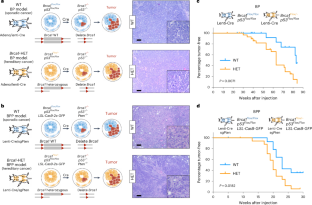Brca1 haploinsufficiency promotes early tumor onset and epigenetic alterations in a mouse model of hereditary breast cancer
IF 31.7
1区 生物学
Q1 GENETICS & HEREDITY
引用次数: 0
Abstract
Germline BRCA1 mutation carriers face a high breast cancer risk; however, the underlying mechanisms for this risk are not completely understood. Using a new genetically engineered mouse model of germline Brca1 heterozygosity, we demonstrate that early tumor onset in a Brca1 heterozygous background cannot be fully explained by the conventional ‘two-hit’ hypothesis, suggesting the existence of inherent tumor-promoting alterations in the Brca1 heterozygous state. Single-cell RNA sequencing and assay for transposase-accessible chromatin with sequencing analyses uncover a unique set of differentially accessible chromatin regions in ostensibly normal Brca1 heterozygous mammary epithelial cells, distinct from wild-type cells and partially mimicking the chromatin and RNA-level changes in tumor cells. Transcription factor analyses identify loss of ELF5 and gain of AP-1 sites in these epigenetically primed regions; in vivo experiments further implicate AP-1 and Wnt10a as strong promoters of Brca1-related breast cancer. These findings reveal a previously unappreciated epigenetic effect of Brca1 haploinsufficiency in accelerating tumorigenesis, advancing our mechanistic understanding and informing potential therapeutic strategies. A second hit to Brca1 in heterozygous mice leads to accelerated tumor development compared to wild-type mice in which both alleles are simultaneously deleted. This is because of an epigenetic state associated with Brca1 haploinsufficiency that impacts AP-1 and Wnt10a.


在遗传性乳腺癌小鼠模型中,Brca1单倍体缺失会促进肿瘤的早期发生和表观遗传学改变
种系 BRCA1 基因突变携带者面临着很高的乳腺癌风险;然而,这种风险的内在机制尚未完全明了。我们利用一种新的基因工程小鼠种系BRCA1杂合模型证明,传统的 "两击 "假说不能完全解释BRCA1杂合背景下肿瘤的早期发病,这表明在BRCA1杂合状态下存在固有的促肿瘤改变。单细胞 RNA 测序和转座酶可及染色质检测与测序分析在表面正常的 Brca1 杂合子乳腺上皮细胞中发现了一组独特的可及染色质区域,它们不同于野生型细胞,部分模拟了肿瘤细胞中染色质和 RNA 水平的变化。转录因子分析确定了这些表观遗传启动区中 ELF5 位点的缺失和 AP-1 位点的增殖;体内实验进一步表明 AP-1 和 Wnt10a 是 Brca1 相关乳腺癌的强启动子。这些发现揭示了 Brca1 单倍体缺乏症在加速肿瘤发生方面以前未被认识到的表观遗传学效应,加深了我们对机理的理解,并为潜在的治疗策略提供了信息。
本文章由计算机程序翻译,如有差异,请以英文原文为准。
求助全文
约1分钟内获得全文
求助全文
来源期刊

Nature genetics
生物-遗传学
CiteScore
43.00
自引率
2.60%
发文量
241
审稿时长
3 months
期刊介绍:
Nature Genetics publishes the very highest quality research in genetics. It encompasses genetic and functional genomic studies on human and plant traits and on other model organisms. Current emphasis is on the genetic basis for common and complex diseases and on the functional mechanism, architecture and evolution of gene networks, studied by experimental perturbation.
Integrative genetic topics comprise, but are not limited to:
-Genes in the pathology of human disease
-Molecular analysis of simple and complex genetic traits
-Cancer genetics
-Agricultural genomics
-Developmental genetics
-Regulatory variation in gene expression
-Strategies and technologies for extracting function from genomic data
-Pharmacological genomics
-Genome evolution
 求助内容:
求助内容: 应助结果提醒方式:
应助结果提醒方式:


